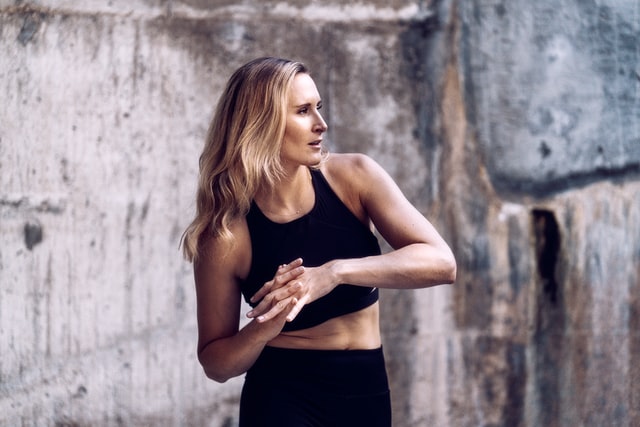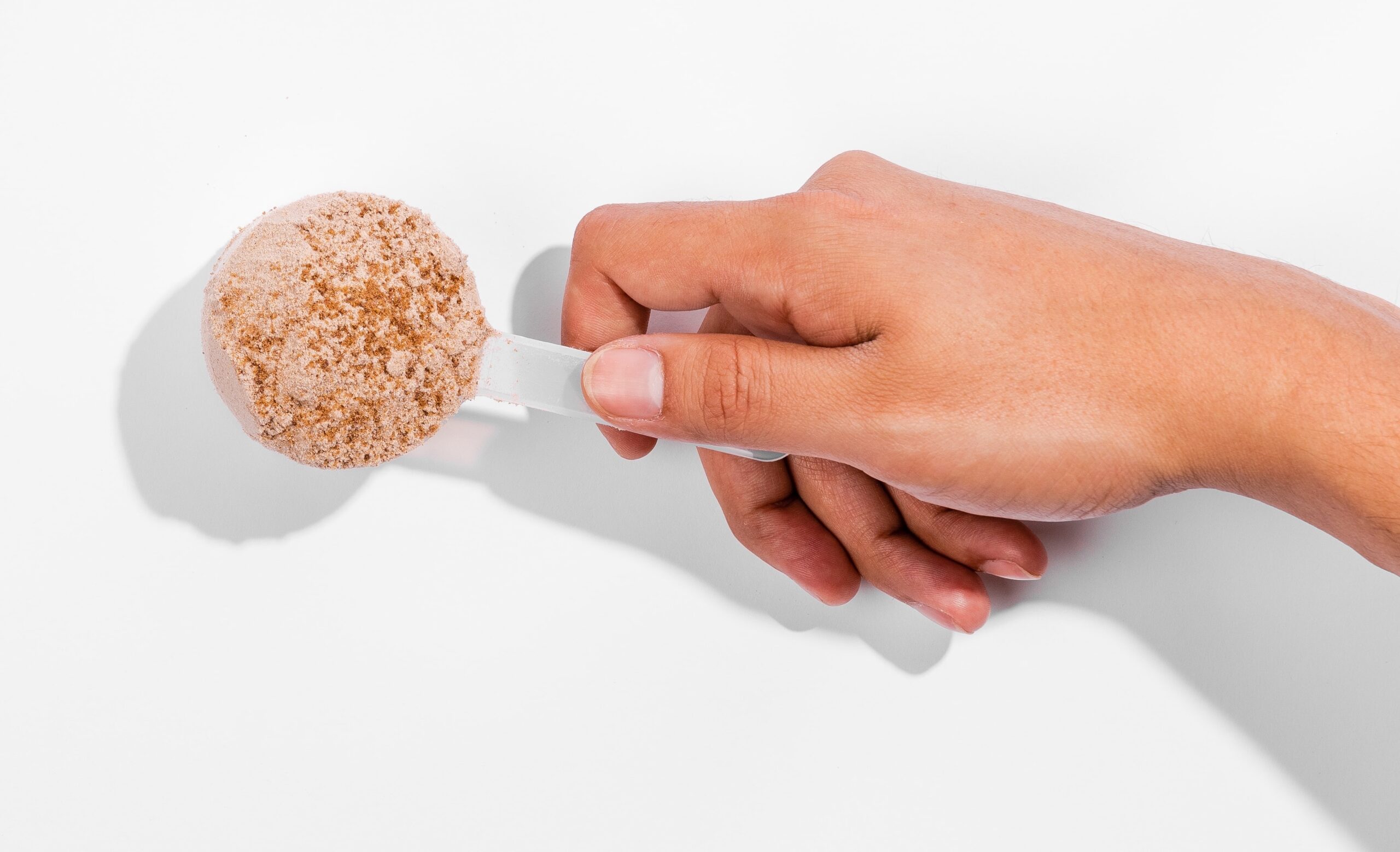Protein Guide for Women: How to Tone Up + Lose Weight
Nutrition is often a hot topic among women, whether it is the new diet fad or what they should or should not be eating. Protein is often among the conversation. In the fitness industry, it is the holy grail while others feel they should limit their protein due to fear they will be too bulky and it will make them gain weight. So which is it?
What is protein + why it is good for women

The body needs three different types of macronutrients daily: fat, carbohydrates and protein. Fat stores energy and provides essential fatty acids and absorbs certain vitamins, while also keeping you full longer. Carbs are your body’s energy source–your organs need carbs to function properly. Protein helps your body build and repair bones, constructs lean muscles, and strengthens hair, skin and nails, while also supporting your immune system.
If you are someone who wants to have plump, firm skin, healthy hair and nails, and sleek toned muscles, then make sure you are incorporating the right amount of proteins into your diet.
If you are not getting protein in your diet or are eating very little, you could see long term effect. As protein is often linked to muscles, you might be able to guess that a lack of protein will lead to lost muscle mass and weakened strength that could make it harder to do simple tasks. Limiting protein, or undereating to try to lose weight, can actually slow your metabolism, which is the opposite of what you would want. A lack of protein will also cause fatigue, as your cells will not get as much oxygen.
These are just a few effects, but hopefully enough for you to want to make sure you’re eating your proteins!
How much protein should you consume?
Now I am sure you’re wondering how much protein you should be eating and if you are lacking protein, so let me tell you! To start out, there is no magical amount of protein that will solve all your issues, but there are certain ranges and guides I can give you to reference and work towards. If you want an approach specifically tailored to you, I recommend working with a nutritional coach.
One of the protein guidelines you will see out there is 1g per body pound that you weigh, which for certain people can work, but this is definitely not a one size fits all. A better way to look at this rule is between 0.5-1g per body pound. Then, cross-reference this protein with your daily protein percentage. For the women who have a thinner body already and are looking to make sure they get enough protein for body function and to optimize the pros of protein, aim for 20-25% of your daily food intake to be protein. For women looking to lose weight and increase their metabolism while staying full longer and lowering cravings, aim for 35% of your daily intake from protein. Lastly, for women with athletic builds or do not have weight to lose but want to add on lean muscle mass, aim for 30% of protein per day.
Calculating your ideal protein consumption
To figure out how many calories you should be consuming in a day, input your stats into a calorie calculator like this one. Then, if you want to keep your weight or change your body composition (increase muscle mass), use the daily calories that are calculated for you. If you want to lose weight, subtract 500 calories from that number. Next, to calculate your protein numbers, take your percentage from the above paragraph and multiply it by your daily calorie number from the calculator, and divide that total by 4 (the number of calories in one gram of protein). This will give you the total grams of protein you should target each day!
Example: I need 2,200 calories a day to maintain my weight, but would like to lose weight. Because I want to lose weight, I reduce my daily calories by 500 to 1,700. My body type is in the heavier bodyweight category, so I chose to have 35% of my calories from protein. 1,700 x 35% / 4 = 149 calories from protein.
One of my biggest surprises with doing this calculation was how much protein I should target to consume and how full I was eating it. If you are switching from eating a carb-heavy diet, carbs are calories dense foods and cause blood sugar spikes which make you hungry an hour or two later. Once you focus on proteins, you will find you are full before eating your daily calories which opened my eyes to the power of protein.
Does protein make you bulky?

No! I have talked up protein for years to my friends, and almost every single one of them was hesitant to add protein into their diet because they didn’t want to gain a ton of muscle. The great thing is, it doesn’t make you look bulky unless you are trying extremely hard and spending a few hours a day weight lifting combined with consuming excess calories and carbs each day. Usually the extra calories alone will make anyone begin to gain weight, so this is not something you need to worry about with protein if your total calories are in check. It helps men gain muscle mass because of the testosterone they have in their body that aids in building muscle, but women simply do not have the same ability to bulk up. It takes women an extremely long time to build muscle, whereas men can add on muscle quickly due to their testosterone. Increasing the amount of protein you consume relative to your total daily calories will not make you bulky, and will only add some lean muscle tone if you are weight training.
What can I eat to get enough protein?
The best way to eat protein is through whole foods. This consists of foods like meat, beans, fish, eggs and nuts. Some foods are higher in protein content like chicken, turkey and egg whites. Whereas others like fish and nuts have a combination of fats in them as well. If you are counting your macros, then it will be good for you to learn what foods you like that are pure protein and which ones are maybe only half protein. Lots of foods have some protein and you will be surprised how it will start to add up when you eat foods such as cheeses. For the healthiest proteins, look for grass-fed, organic meats, wild-caught fish, pasture-raised eggs and organic, local nuts.
After whole foods, another way to consume more protein is through supplemental powders. Protein powders can also be pure protein or they can have a mixture of fats and carbs in them as well. When selecting a protein powder, look for one without added sugar. Many powders add sugars to make them taste better or taste like dessert, but sometimes the sugar can outweigh the benefit. You should look for grass-fed and finished protein powders if you decide on an animal product, or you can opt for a plant-based protein powder. One thing to note is that protein powders with quality ingredients will typically be around $1-2 per serving. If a protein powder seems expensive, check the amount of servings and quality of the protein.
Different types of protein supplements

[This post contains affiliate links. If you make a purchase, we make a small commission paid for by the vendor at no additional cost to you! We only suggest products we personally use and love, and know will make your life easier and healthier.]
Animal products
The main type of protein powder you will see on the market is whey protein. Whey is a dairy product, so if you are allergic or cutting out dairy for any reason, this is not the product for you. One of the positives of whey protein is that it is rich in BCAAs (branch chain amino acids) and leucine. This will help with muscle growth and recovery when consumed after exercise. There are also other proteins made from animal meat and bones.
My favorite products: Be Well by Kelly (super simple ingredients, no sugar, and grass-fed beef, created by a celebrity nutritionist)
Vegan options
If you are Vegan, there are many plant-based proteins on the market and are made from anything from peas to pumpkin seeds to brown rice to hemp. Many times these are not considered complete proteins, so look for a powder that has a mix of protein sources to get a complete protein. Because plant proteins are higher in fiber than whey, they usually take longer to digest, which is necessarily positive or negative.
My favorite products: Tone It Up (its organic, along with sugar and gluten free) and Vega (tastes like a milkshake, no added sugar, and has your greens in it!)
Collagen
My favorite supplement is collagen protein. It is derived from animal bones, which is where collagen is found, and it is 100% protein. Collagen also supplements hair, skin and nail growth and strengthens joints and bones. Having these added benefits is what has made collagen my favorite type of protein, and I usually try to get in 10-20g per day to see the benefits.
My favorite products: Vital Proteins (unflavored option, pasture-raised and grass-fed, added Vitamin C as it aids in collagen absorption) and Ancient Nutrition (5 protein sources, no sugar, sustainably sourced)
Now it’s your turn!
Protein is an essential part of everyone’s diet and can also aid in losing weight or gaining lean muscle. Everyone can find a way for protein to supplement their goals. I hope you find the right amount for your consumption and learn the importance of protein, especially if you are looking to lose weight. It has made a huge difference in my past weight loss journey, and I know it will help yours as well! Let me know if you have any questions for me in the comments!
Hi, my name is Cara! My personal journey with cancer and weight loss has led me to developing a passion for helping others with nutrition, fitness, and self care.
3 thoughts on “Protein Guide for Women: How to Tone Up + Lose Weight”